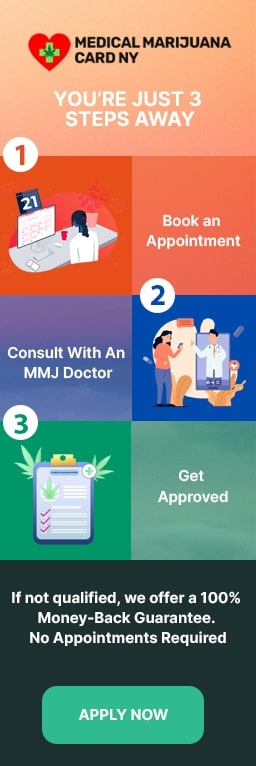Qualifying Conditions For Medical Marijuana Card In New York
What Are The Qualify Medical Conditions for Medical Marijuana Treatment in New York 2024?
In New York, the approach to qualifying medical conditions for medical marijuana use is notably flexible and patient-centric. Unlike many other states, New York does not have a fixed list of qualifying conditions. Instead, the decision to recommend medical marijuana is left to the discretion of healthcare providers. This approach allows physicians, nurse practitioners, and physician assistants who are certified to prescribe medical marijuana to make recommendations based on their clinical judgment and the specific health needs of their patients. This flexibility is crucial in accommodating a wide range of conditions and symptoms that may benefit from medical marijuana treatment.
Which Medical Conditions are Commonly Treated with Medical Marijuana in New York 2024?
Given the flexible approach in New York, a variety of medical conditions are commonly treated with medical marijuana. While there isn’t a predefined list, the following conditions are frequently cited by healthcare providers for medical marijuana treatment:
Chronic Pain: Chronic pain is a long-standing pain that persists beyond the usual recovery period or occurs along with a chronic health condition, such as arthritis.
Arthritis: This condition involves inflammation and stiffness of the joints, which can be painful and debilitating.
Multiple Sclerosis (MS): MS is a disease of the central nervous system that disrupts the flow of information within the brain, and between the brain and body, often leading to muscle weakness and coordination problems.
Epilepsy: A neurological disorder marked by sudden recurrent episodes of sensory disturbance, loss of consciousness, or convulsions, associated with abnormal electrical activity in the brain.
Cancer: This group of diseases involves abnormal cell growth with the potential to invade or spread to other parts of the body, often causing pain and nausea.
Parkinson’s Disease: A progressive nervous system disorder that affects movement, causing tremors, stiffness, and difficulty with balance and coordination.
HIV/AIDS: A disease of the human immune system caused by the human immunodeficiency virus (HIV), often leading to chronic pain and wasting syndrome.
Glaucoma: A condition that damages the optic nerve and can lead to vision loss and blindness, often associated with a buildup of pressure inside the eye.
PTSD (Post-Traumatic Stress Disorder): A psychiatric disorder that can occur in people who have experienced or witnessed a traumatic event.
Inflammatory Bowel Disease: A group of inflammatory conditions of the colon and small intestine, such as Crohn’s disease and ulcerative colitis.
Neuropathies: Disorders of the peripheral nerves causing weakness, numbness, and pain, typically in the hands and feet.
Spinal Cord Injury: Damage to the spinal cord that causes changes in its function, either temporary or permanent, including loss of muscle function, sensation, or autonomic function in the parts of the body served by the spinal cord below the level of the lesion.
Huntington’s Disease: A hereditary disease that causes the progressive breakdown (degeneration) of nerve cells in the brain.
Amyotrophic Lateral Sclerosis (ALS): Also known as Lou Gehrig’s disease, it’s a specific disease that causes the death of neurons controlling voluntary muscles.
Autism Spectrum Disorders: A range of conditions characterized by challenges with social skills, repetitive behaviors, speech, and nonverbal communication.
Chronic Inflammatory Demyelinating Polyneuropathy: A neurological disorder characterized by progressive weakness and impaired sensory function in the legs and arms.
Spasticity and Muscle Spasms: Conditions often associated with disorders like MS and
spinal cord injuries, involving involuntary muscle stiffness or spasms.
Alzheimer’s Disease: A progressive neurologic disorder that causes the brain to shrink and brain cells to die, leading to memory loss and cognitive decline.
Migraines: A type of headache characterized by intense, debilitating pain, often accompanied by nausea, vomiting, and sensitivity to light and sound.
It’s important to note that the decision to use medical marijuana for these or any other conditions is made on a case-by-case basis, depending on the patient’s specific circumstances and the clinical judgment of their healthcare provider. This patient-centered approach ensures that medical marijuana is used in a way that is tailored to the individual needs and health objectives of each patient.
Can Medical Marijuana Recommendations Differ Based on Medical Conditions in New York 2024?
In New York, medical marijuana recommendations can indeed differ based on individual medical conditions. This is primarily because New York’s approach to medical marijuana is highly patient-centric and flexible, allowing healthcare providers to use their clinical judgment in recommending medical marijuana. This means that the type, dosage, and form of medical marijuana recommended can vary significantly depending on the specific health needs and conditions of each patient.
For instance, a patient with chronic pain may receive a different recommendation than someone with epilepsy or cancer. The goal is to tailor the treatment to achieve the best possible outcomes for each patient’s unique situation.
Healthcare Providers’ Role in Medical Cannabis Recommendations
With the elimination of predefined qualifying conditions, physicians in New York now play a pivotal role. They have the authority to recommend medical cannabis for conditions they deem appropriate. This flexibility allows for a broader range of conditions to be considered for treatment, tailoring healthcare to individual patient needs.
Necessity of Doctor’s Recommendation in New York
Despite the relaxed qualifying conditions, obtaining a doctor’s recommendation remains a mandatory step for accessing medical marijuana in New York. Healthcare providers must be registered and complete a specific training course to prescribe medical cannabis. This ensures that only qualified and knowledgeable professionals are involved in patient care regarding medical marijuana.
Current Status of Medical Marijuana Cards in New York
Interestingly, New York has ceased issuing medical marijuana cards. Instead, patients require a certification from a New York healthcare provider along with a valid government-issued photo ID to purchase medical cannabis. This change simplifies the process, making access to medical marijuana more straightforward for eligible patients.
FAQs Related Medical Conditions in New York
1. What types of medical conditions are eligible for medical marijuana in New York?
In New York, there is no fixed list of qualifying conditions for medical marijuana. Healthcare providers can recommend it for any condition they believe could benefit from its use.
2. Do patients need a specific diagnosis to receive medical marijuana?
Patients do not need a specific diagnosis. The decision to recommend medical marijuana is based on the healthcare provider’s assessment and clinical judgment.
3. Can any healthcare provider prescribe medical marijuana in New York?
Only healthcare providers who are licensed and have completed the necessary training and certification can recommend medical marijuana.
4. Are there different forms of medical marijuana available for different conditions?
Yes, medical marijuana comes in various forms, such as oils, tinctures, capsules, and more. The form prescribed can depend on the patient’s condition and treatment needs.
5. How do patients know what type of medical marijuana is right for them?
Patients should consult with their certified healthcare provider, who can make recommendations based on their medical history, current condition, and treatment goals.
6. Is medical marijuana covered by insurance in New York?
Currently, medical marijuana is not typically covered by insurance in New York.
7. Can patients with mental health conditions use medical marijuana?
Yes, patients with certain mental health conditions may be recommended medical marijuana, but this is determined on a case-by-case basis by the healthcare provider.
8. Are there age restrictions for medical marijuana use in New York?
Yes, patients must meet certain age requirements, and minors require a caregiver to manage their use of medical marijuana.
9. How can patients find a certified healthcare provider for medical marijuana?
Patients can find certified healthcare providers through the New York State Department of Health’s website or through medical facilities offering medical marijuana programs.
10. Can patients from other states use medical marijuana in New York?
Out-of-state patients are not eligible for New York‘s medical marijuana program. They must be residents and meet the state’s program requirements.
Resources
Note: This article’s content is provided for educational purposes only. This information is not intended to serve as a substitute for professional legal or medical advice, diagnosis, or treatment. If you have any concerns or queries regarding laws, regulations, or your health, you should always consult a lawyer, physician, or other licensed practitioner.
Connect With MMJ Doctor Now


